Research Proposal: Mental Health Recovery Project Effectiveness
VerifiedAdded on 2023/01/05
|20
|4139
|40
Project
AI Summary
This research proposal outlines a qualitative study examining the impact of mental health recovery projects on community residents with mental illness, specifically focusing on their return to work and leading purposeful lives. The study will adopt a phenomenological framework, collecting data through semi-structured in-depth interviews with registered nurses experienced in community-based mental health care. The research aims to understand nurses' perspectives on the effectiveness of these projects and will analyze the data thematically. The research will explore how community involvement and work participation influence the recovery process. The anticipated outcomes include recommendations for improving mental health recovery planning and addressing potential ethical considerations. The proposal also acknowledges the limitations of the study, providing a comprehensive plan for investigating the impact of mental health recovery projects.
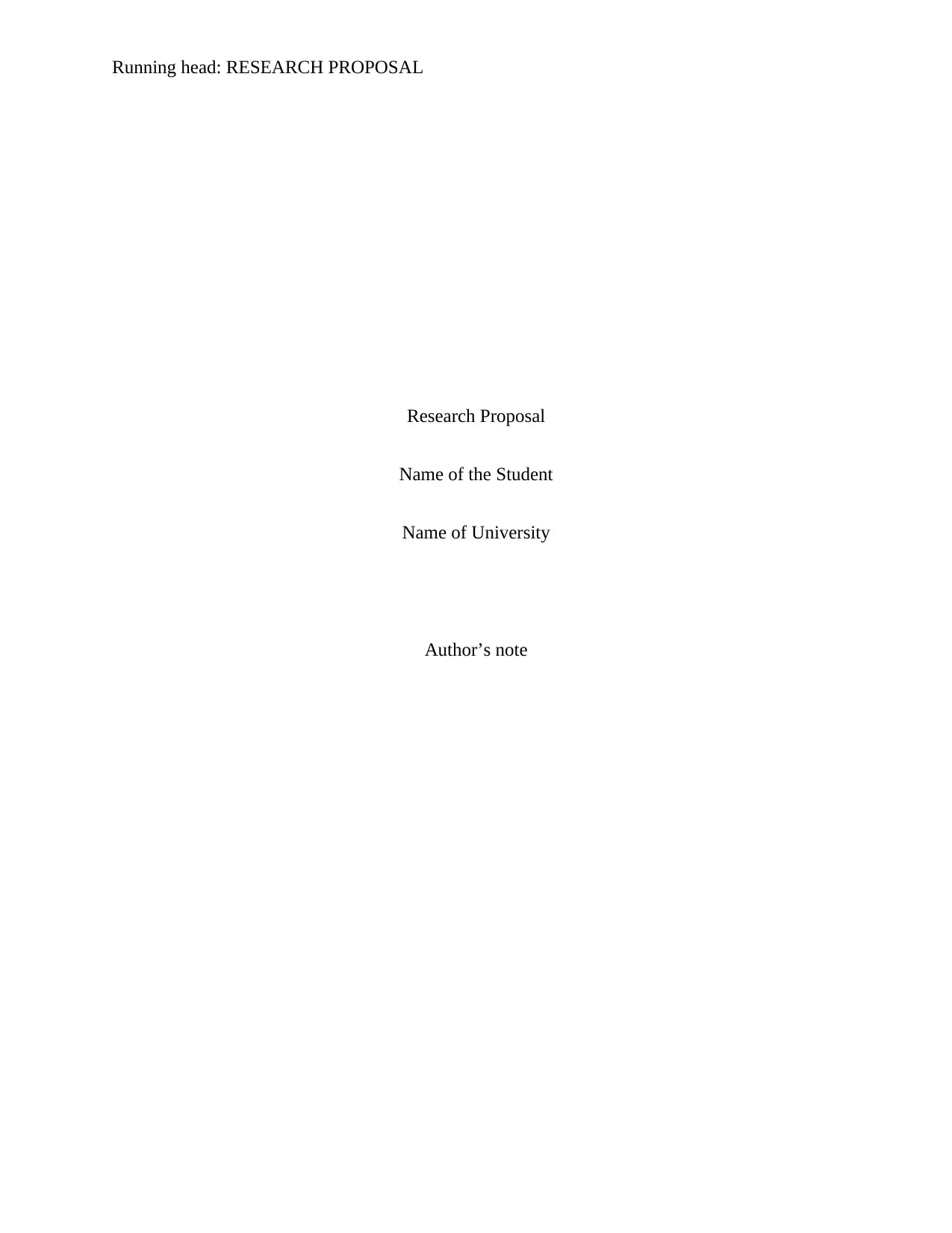
Running head: RESEARCH PROPOSAL
Research Proposal
Name of the Student
Name of University
Author’s note
Research Proposal
Name of the Student
Name of University
Author’s note
Paraphrase This Document
Need a fresh take? Get an instant paraphrase of this document with our AI Paraphraser
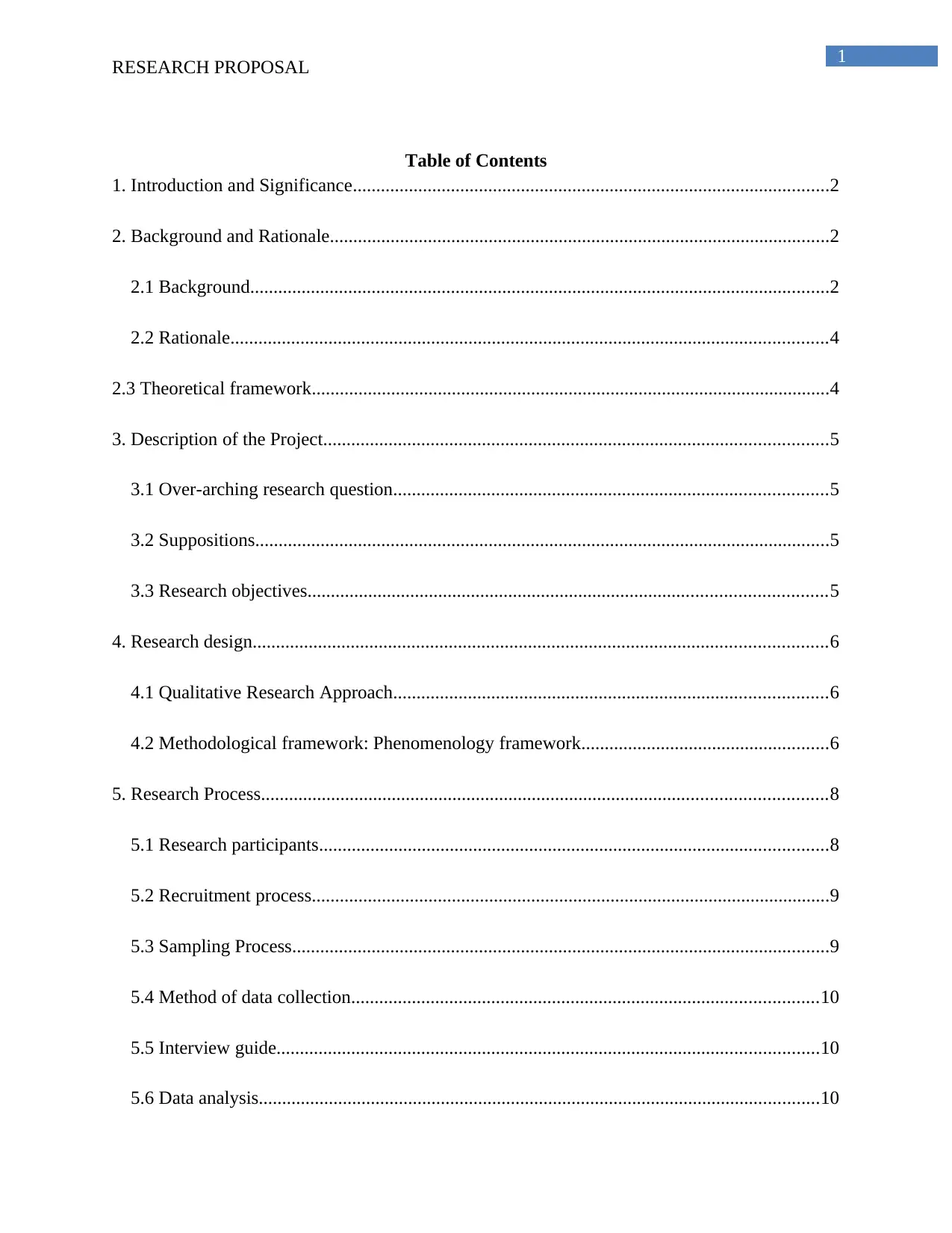
1
RESEARCH PROPOSAL
Table of Contents
1. Introduction and Significance......................................................................................................2
2. Background and Rationale...........................................................................................................2
2.1 Background............................................................................................................................2
2.2 Rationale................................................................................................................................4
2.3 Theoretical framework...............................................................................................................4
3. Description of the Project............................................................................................................5
3.1 Over-arching research question.............................................................................................5
3.2 Suppositions...........................................................................................................................5
3.3 Research objectives...............................................................................................................5
4. Research design...........................................................................................................................6
4.1 Qualitative Research Approach.............................................................................................6
4.2 Methodological framework: Phenomenology framework.....................................................6
5. Research Process.........................................................................................................................8
5.1 Research participants.............................................................................................................8
5.2 Recruitment process...............................................................................................................9
5.3 Sampling Process...................................................................................................................9
5.4 Method of data collection....................................................................................................10
5.5 Interview guide....................................................................................................................10
5.6 Data analysis........................................................................................................................10
RESEARCH PROPOSAL
Table of Contents
1. Introduction and Significance......................................................................................................2
2. Background and Rationale...........................................................................................................2
2.1 Background............................................................................................................................2
2.2 Rationale................................................................................................................................4
2.3 Theoretical framework...............................................................................................................4
3. Description of the Project............................................................................................................5
3.1 Over-arching research question.............................................................................................5
3.2 Suppositions...........................................................................................................................5
3.3 Research objectives...............................................................................................................5
4. Research design...........................................................................................................................6
4.1 Qualitative Research Approach.............................................................................................6
4.2 Methodological framework: Phenomenology framework.....................................................6
5. Research Process.........................................................................................................................8
5.1 Research participants.............................................................................................................8
5.2 Recruitment process...............................................................................................................9
5.3 Sampling Process...................................................................................................................9
5.4 Method of data collection....................................................................................................10
5.5 Interview guide....................................................................................................................10
5.6 Data analysis........................................................................................................................10
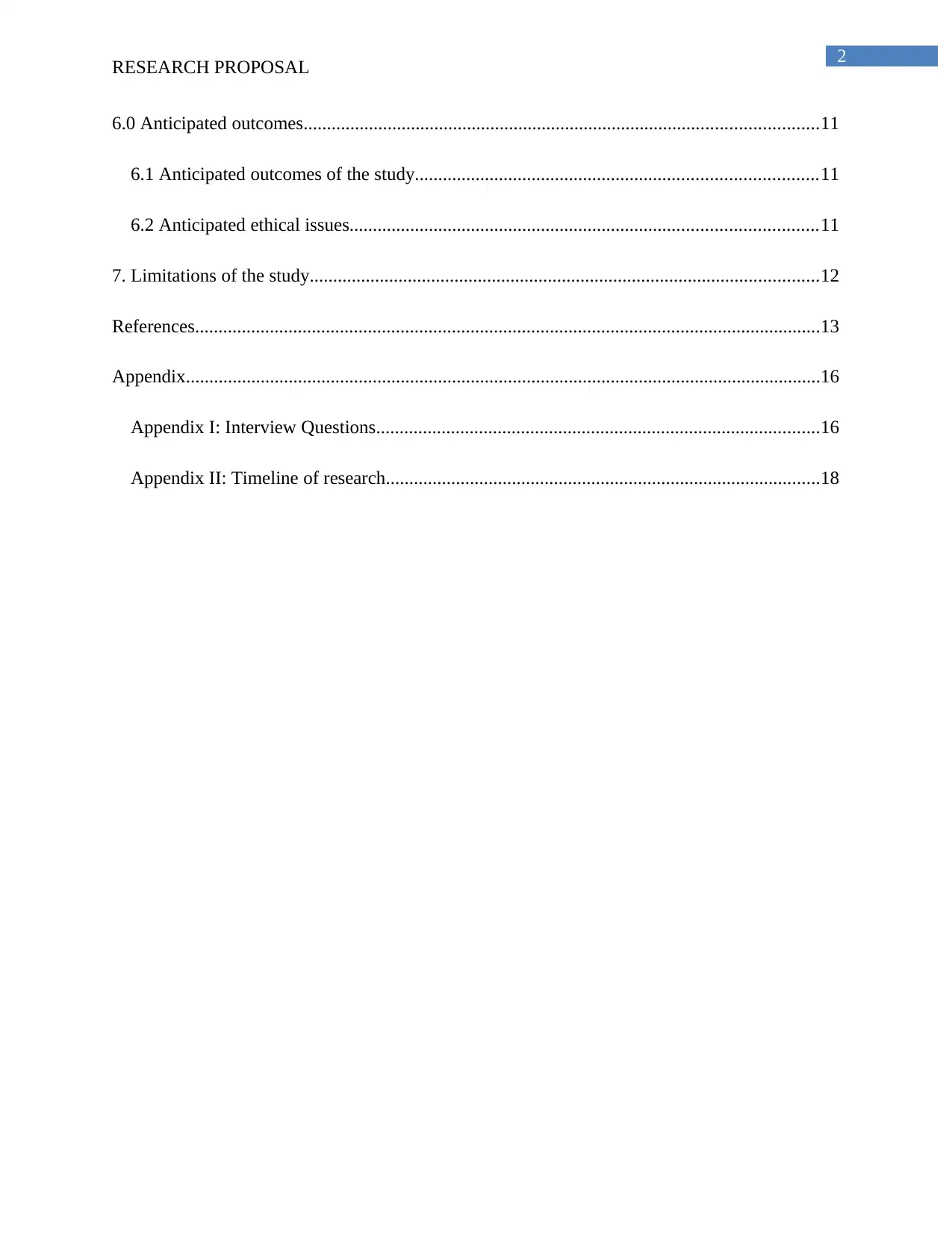
2
RESEARCH PROPOSAL
6.0 Anticipated outcomes..............................................................................................................11
6.1 Anticipated outcomes of the study......................................................................................11
6.2 Anticipated ethical issues....................................................................................................11
7. Limitations of the study.............................................................................................................12
References......................................................................................................................................13
Appendix........................................................................................................................................16
Appendix I: Interview Questions...............................................................................................16
Appendix II: Timeline of research.............................................................................................18
RESEARCH PROPOSAL
6.0 Anticipated outcomes..............................................................................................................11
6.1 Anticipated outcomes of the study......................................................................................11
6.2 Anticipated ethical issues....................................................................................................11
7. Limitations of the study.............................................................................................................12
References......................................................................................................................................13
Appendix........................................................................................................................................16
Appendix I: Interview Questions...............................................................................................16
Appendix II: Timeline of research.............................................................................................18
⊘ This is a preview!⊘
Do you want full access?
Subscribe today to unlock all pages.

Trusted by 1+ million students worldwide
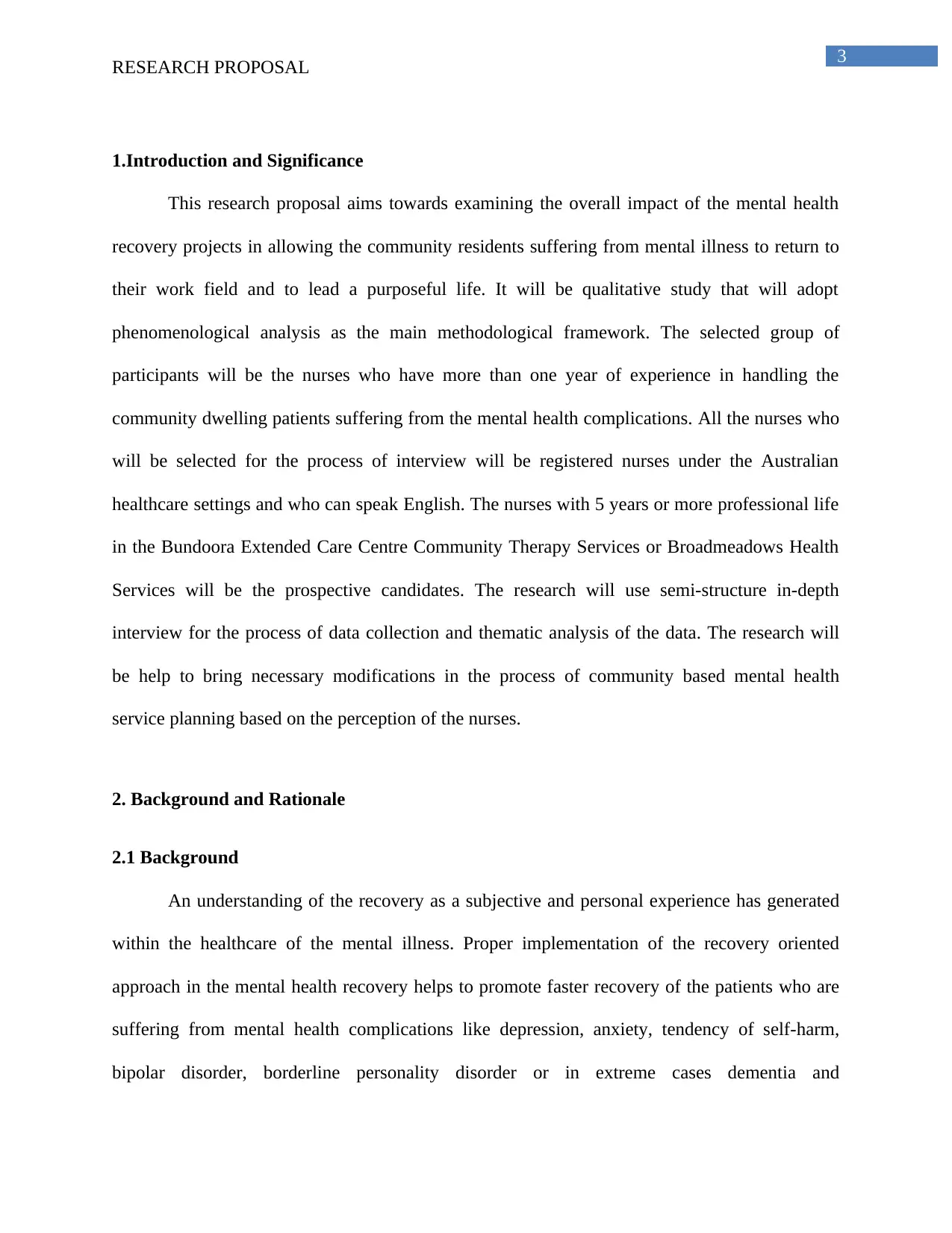
3
RESEARCH PROPOSAL
1.Introduction and Significance
This research proposal aims towards examining the overall impact of the mental health
recovery projects in allowing the community residents suffering from mental illness to return to
their work field and to lead a purposeful life. It will be qualitative study that will adopt
phenomenological analysis as the main methodological framework. The selected group of
participants will be the nurses who have more than one year of experience in handling the
community dwelling patients suffering from the mental health complications. All the nurses who
will be selected for the process of interview will be registered nurses under the Australian
healthcare settings and who can speak English. The nurses with 5 years or more professional life
in the Bundoora Extended Care Centre Community Therapy Services or Broadmeadows Health
Services will be the prospective candidates. The research will use semi-structure in-depth
interview for the process of data collection and thematic analysis of the data. The research will
be help to bring necessary modifications in the process of community based mental health
service planning based on the perception of the nurses.
2. Background and Rationale
2.1 Background
An understanding of the recovery as a subjective and personal experience has generated
within the healthcare of the mental illness. Proper implementation of the recovery oriented
approach in the mental health recovery helps to promote faster recovery of the patients who are
suffering from mental health complications like depression, anxiety, tendency of self-harm,
bipolar disorder, borderline personality disorder or in extreme cases dementia and
RESEARCH PROPOSAL
1.Introduction and Significance
This research proposal aims towards examining the overall impact of the mental health
recovery projects in allowing the community residents suffering from mental illness to return to
their work field and to lead a purposeful life. It will be qualitative study that will adopt
phenomenological analysis as the main methodological framework. The selected group of
participants will be the nurses who have more than one year of experience in handling the
community dwelling patients suffering from the mental health complications. All the nurses who
will be selected for the process of interview will be registered nurses under the Australian
healthcare settings and who can speak English. The nurses with 5 years or more professional life
in the Bundoora Extended Care Centre Community Therapy Services or Broadmeadows Health
Services will be the prospective candidates. The research will use semi-structure in-depth
interview for the process of data collection and thematic analysis of the data. The research will
be help to bring necessary modifications in the process of community based mental health
service planning based on the perception of the nurses.
2. Background and Rationale
2.1 Background
An understanding of the recovery as a subjective and personal experience has generated
within the healthcare of the mental illness. Proper implementation of the recovery oriented
approach in the mental health recovery helps to promote faster recovery of the patients who are
suffering from mental health complications like depression, anxiety, tendency of self-harm,
bipolar disorder, borderline personality disorder or in extreme cases dementia and
Paraphrase This Document
Need a fresh take? Get an instant paraphrase of this document with our AI Paraphraser
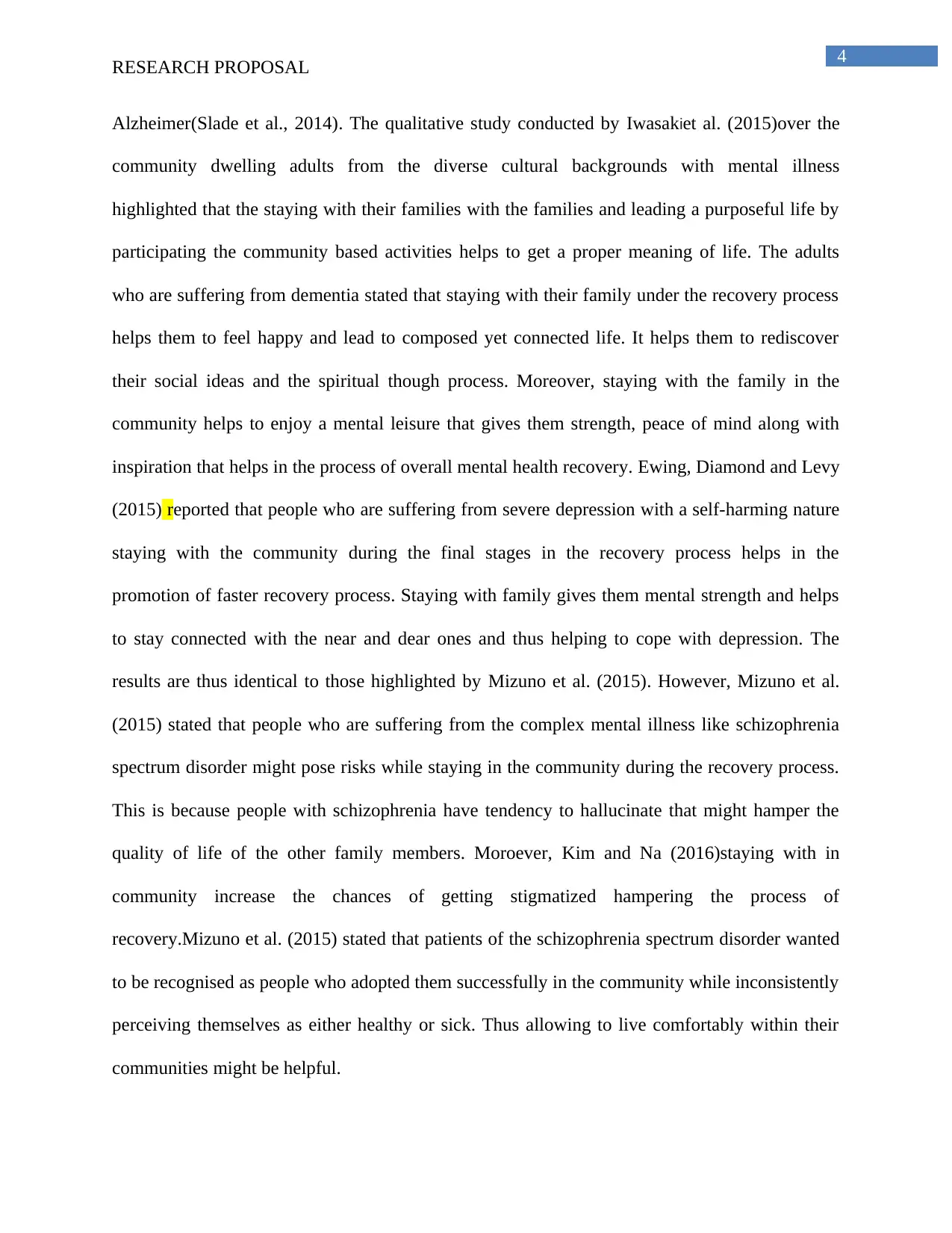
4
RESEARCH PROPOSAL
Alzheimer(Slade et al., 2014). The qualitative study conducted by Iwasakiet al. (2015)over the
community dwelling adults from the diverse cultural backgrounds with mental illness
highlighted that the staying with their families with the families and leading a purposeful life by
participating the community based activities helps to get a proper meaning of life. The adults
who are suffering from dementia stated that staying with their family under the recovery process
helps them to feel happy and lead to composed yet connected life. It helps them to rediscover
their social ideas and the spiritual though process. Moreover, staying with the family in the
community helps to enjoy a mental leisure that gives them strength, peace of mind along with
inspiration that helps in the process of overall mental health recovery. Ewing, Diamond and Levy
(2015) reported that people who are suffering from severe depression with a self-harming nature
staying with the community during the final stages in the recovery process helps in the
promotion of faster recovery process. Staying with family gives them mental strength and helps
to stay connected with the near and dear ones and thus helping to cope with depression. The
results are thus identical to those highlighted by Mizuno et al. (2015). However, Mizuno et al.
(2015) stated that people who are suffering from the complex mental illness like schizophrenia
spectrum disorder might pose risks while staying in the community during the recovery process.
This is because people with schizophrenia have tendency to hallucinate that might hamper the
quality of life of the other family members. Moroever, Kim and Na (2016)staying with in
community increase the chances of getting stigmatized hampering the process of
recovery.Mizuno et al. (2015) stated that patients of the schizophrenia spectrum disorder wanted
to be recognised as people who adopted them successfully in the community while inconsistently
perceiving themselves as either healthy or sick. Thus allowing to live comfortably within their
communities might be helpful.
RESEARCH PROPOSAL
Alzheimer(Slade et al., 2014). The qualitative study conducted by Iwasakiet al. (2015)over the
community dwelling adults from the diverse cultural backgrounds with mental illness
highlighted that the staying with their families with the families and leading a purposeful life by
participating the community based activities helps to get a proper meaning of life. The adults
who are suffering from dementia stated that staying with their family under the recovery process
helps them to feel happy and lead to composed yet connected life. It helps them to rediscover
their social ideas and the spiritual though process. Moreover, staying with the family in the
community helps to enjoy a mental leisure that gives them strength, peace of mind along with
inspiration that helps in the process of overall mental health recovery. Ewing, Diamond and Levy
(2015) reported that people who are suffering from severe depression with a self-harming nature
staying with the community during the final stages in the recovery process helps in the
promotion of faster recovery process. Staying with family gives them mental strength and helps
to stay connected with the near and dear ones and thus helping to cope with depression. The
results are thus identical to those highlighted by Mizuno et al. (2015). However, Mizuno et al.
(2015) stated that people who are suffering from the complex mental illness like schizophrenia
spectrum disorder might pose risks while staying in the community during the recovery process.
This is because people with schizophrenia have tendency to hallucinate that might hamper the
quality of life of the other family members. Moroever, Kim and Na (2016)staying with in
community increase the chances of getting stigmatized hampering the process of
recovery.Mizuno et al. (2015) stated that patients of the schizophrenia spectrum disorder wanted
to be recognised as people who adopted them successfully in the community while inconsistently
perceiving themselves as either healthy or sick. Thus allowing to live comfortably within their
communities might be helpful.
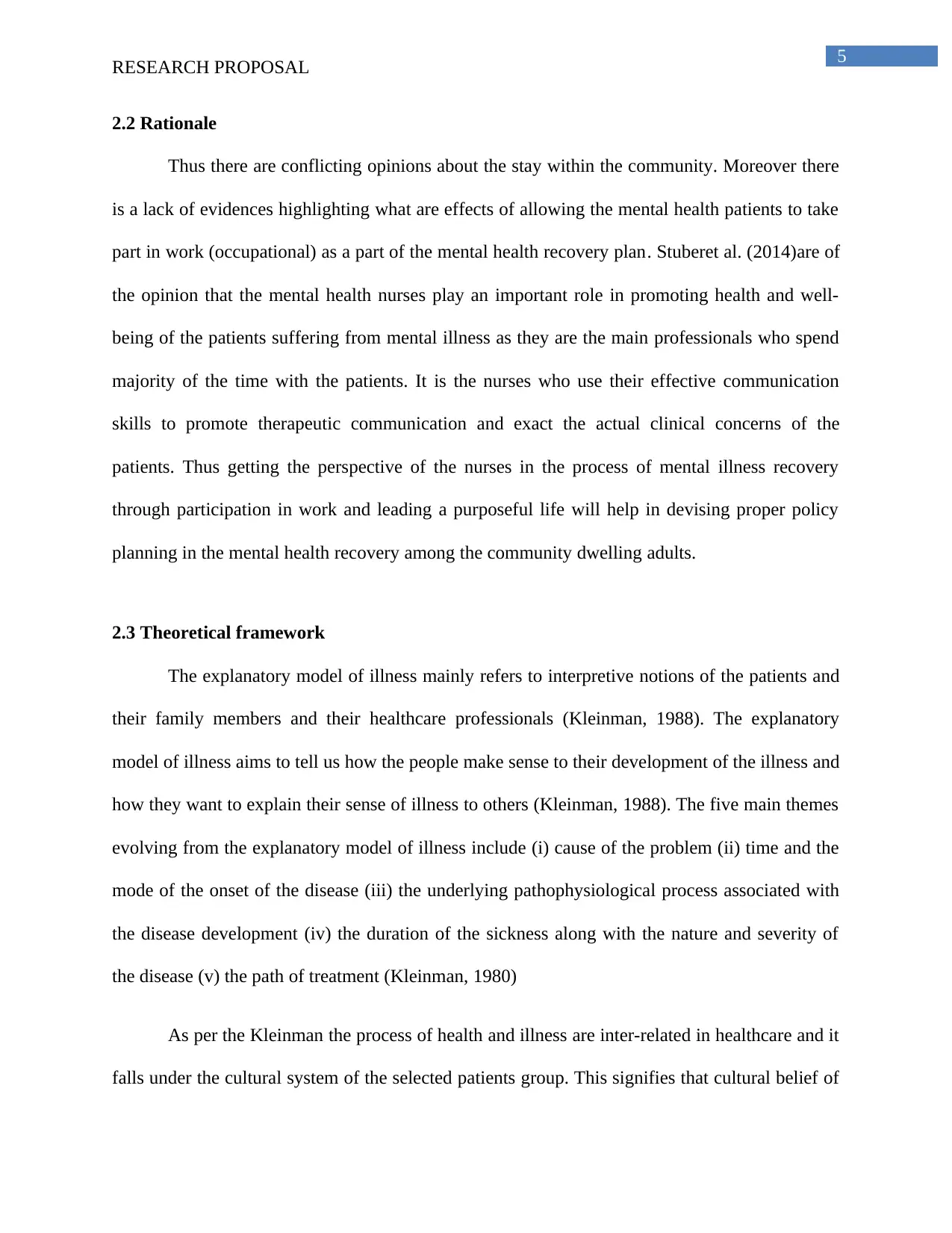
5
RESEARCH PROPOSAL
2.2 Rationale
Thus there are conflicting opinions about the stay within the community. Moreover there
is a lack of evidences highlighting what are effects of allowing the mental health patients to take
part in work (occupational) as a part of the mental health recovery plan. Stuberet al. (2014)are of
the opinion that the mental health nurses play an important role in promoting health and well-
being of the patients suffering from mental illness as they are the main professionals who spend
majority of the time with the patients. It is the nurses who use their effective communication
skills to promote therapeutic communication and exact the actual clinical concerns of the
patients. Thus getting the perspective of the nurses in the process of mental illness recovery
through participation in work and leading a purposeful life will help in devising proper policy
planning in the mental health recovery among the community dwelling adults.
2.3 Theoretical framework
The explanatory model of illness mainly refers to interpretive notions of the patients and
their family members and their healthcare professionals (Kleinman, 1988). The explanatory
model of illness aims to tell us how the people make sense to their development of the illness and
how they want to explain their sense of illness to others (Kleinman, 1988). The five main themes
evolving from the explanatory model of illness include (i) cause of the problem (ii) time and the
mode of the onset of the disease (iii) the underlying pathophysiological process associated with
the disease development (iv) the duration of the sickness along with the nature and severity of
the disease (v) the path of treatment (Kleinman, 1980)
As per the Kleinman the process of health and illness are inter-related in healthcare and it
falls under the cultural system of the selected patients group. This signifies that cultural belief of
RESEARCH PROPOSAL
2.2 Rationale
Thus there are conflicting opinions about the stay within the community. Moreover there
is a lack of evidences highlighting what are effects of allowing the mental health patients to take
part in work (occupational) as a part of the mental health recovery plan. Stuberet al. (2014)are of
the opinion that the mental health nurses play an important role in promoting health and well-
being of the patients suffering from mental illness as they are the main professionals who spend
majority of the time with the patients. It is the nurses who use their effective communication
skills to promote therapeutic communication and exact the actual clinical concerns of the
patients. Thus getting the perspective of the nurses in the process of mental illness recovery
through participation in work and leading a purposeful life will help in devising proper policy
planning in the mental health recovery among the community dwelling adults.
2.3 Theoretical framework
The explanatory model of illness mainly refers to interpretive notions of the patients and
their family members and their healthcare professionals (Kleinman, 1988). The explanatory
model of illness aims to tell us how the people make sense to their development of the illness and
how they want to explain their sense of illness to others (Kleinman, 1988). The five main themes
evolving from the explanatory model of illness include (i) cause of the problem (ii) time and the
mode of the onset of the disease (iii) the underlying pathophysiological process associated with
the disease development (iv) the duration of the sickness along with the nature and severity of
the disease (v) the path of treatment (Kleinman, 1980)
As per the Kleinman the process of health and illness are inter-related in healthcare and it
falls under the cultural system of the selected patients group. This signifies that cultural belief of
⊘ This is a preview!⊘
Do you want full access?
Subscribe today to unlock all pages.

Trusted by 1+ million students worldwide
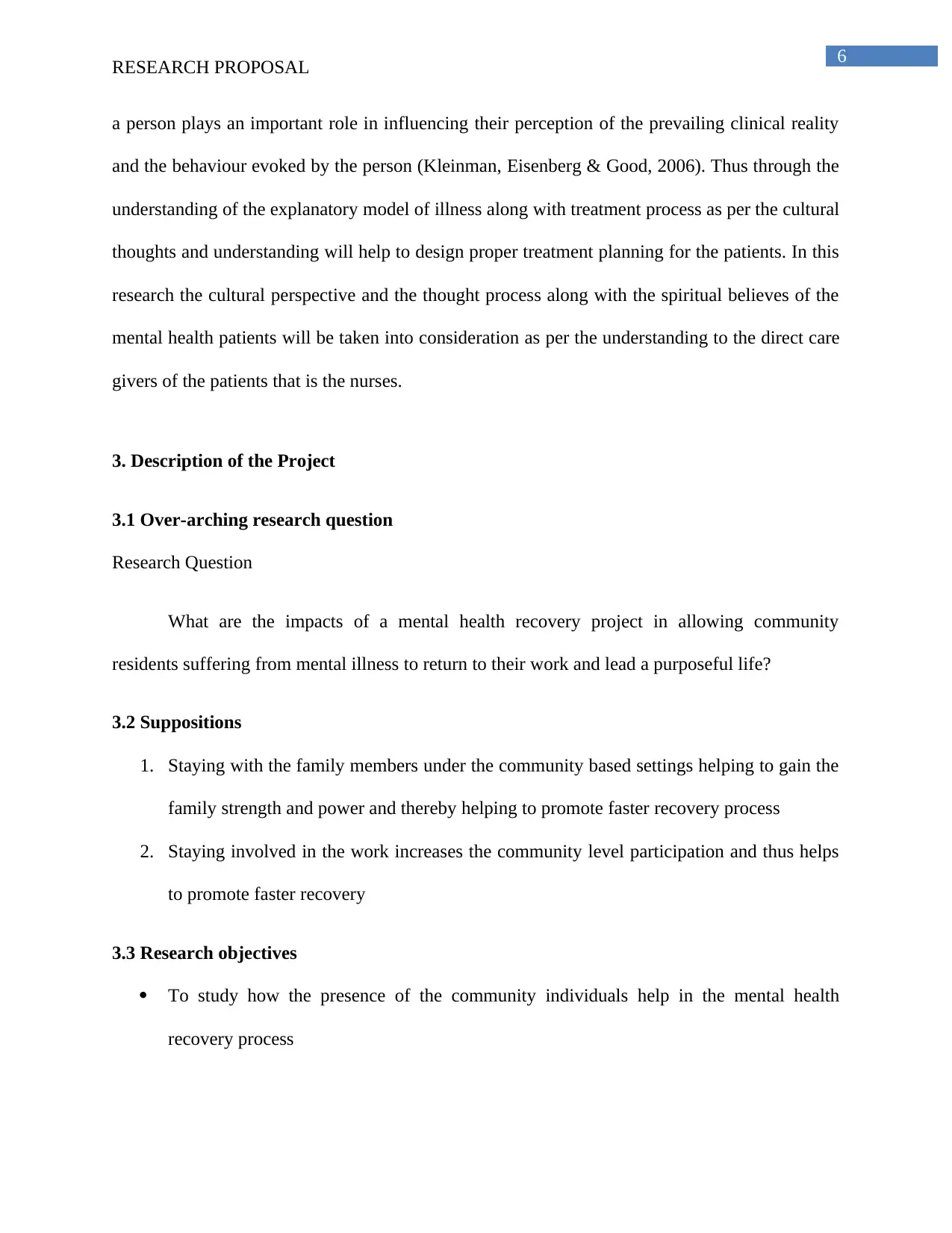
6
RESEARCH PROPOSAL
a person plays an important role in influencing their perception of the prevailing clinical reality
and the behaviour evoked by the person (Kleinman, Eisenberg & Good, 2006). Thus through the
understanding of the explanatory model of illness along with treatment process as per the cultural
thoughts and understanding will help to design proper treatment planning for the patients. In this
research the cultural perspective and the thought process along with the spiritual believes of the
mental health patients will be taken into consideration as per the understanding to the direct care
givers of the patients that is the nurses.
3. Description of the Project
3.1 Over-arching research question
Research Question
What are the impacts of a mental health recovery project in allowing community
residents suffering from mental illness to return to their work and lead a purposeful life?
3.2 Suppositions
1. Staying with the family members under the community based settings helping to gain the
family strength and power and thereby helping to promote faster recovery process
2. Staying involved in the work increases the community level participation and thus helps
to promote faster recovery
3.3 Research objectives
To study how the presence of the community individuals help in the mental health
recovery process
RESEARCH PROPOSAL
a person plays an important role in influencing their perception of the prevailing clinical reality
and the behaviour evoked by the person (Kleinman, Eisenberg & Good, 2006). Thus through the
understanding of the explanatory model of illness along with treatment process as per the cultural
thoughts and understanding will help to design proper treatment planning for the patients. In this
research the cultural perspective and the thought process along with the spiritual believes of the
mental health patients will be taken into consideration as per the understanding to the direct care
givers of the patients that is the nurses.
3. Description of the Project
3.1 Over-arching research question
Research Question
What are the impacts of a mental health recovery project in allowing community
residents suffering from mental illness to return to their work and lead a purposeful life?
3.2 Suppositions
1. Staying with the family members under the community based settings helping to gain the
family strength and power and thereby helping to promote faster recovery process
2. Staying involved in the work increases the community level participation and thus helps
to promote faster recovery
3.3 Research objectives
To study how the presence of the community individuals help in the mental health
recovery process
Paraphrase This Document
Need a fresh take? Get an instant paraphrase of this document with our AI Paraphraser
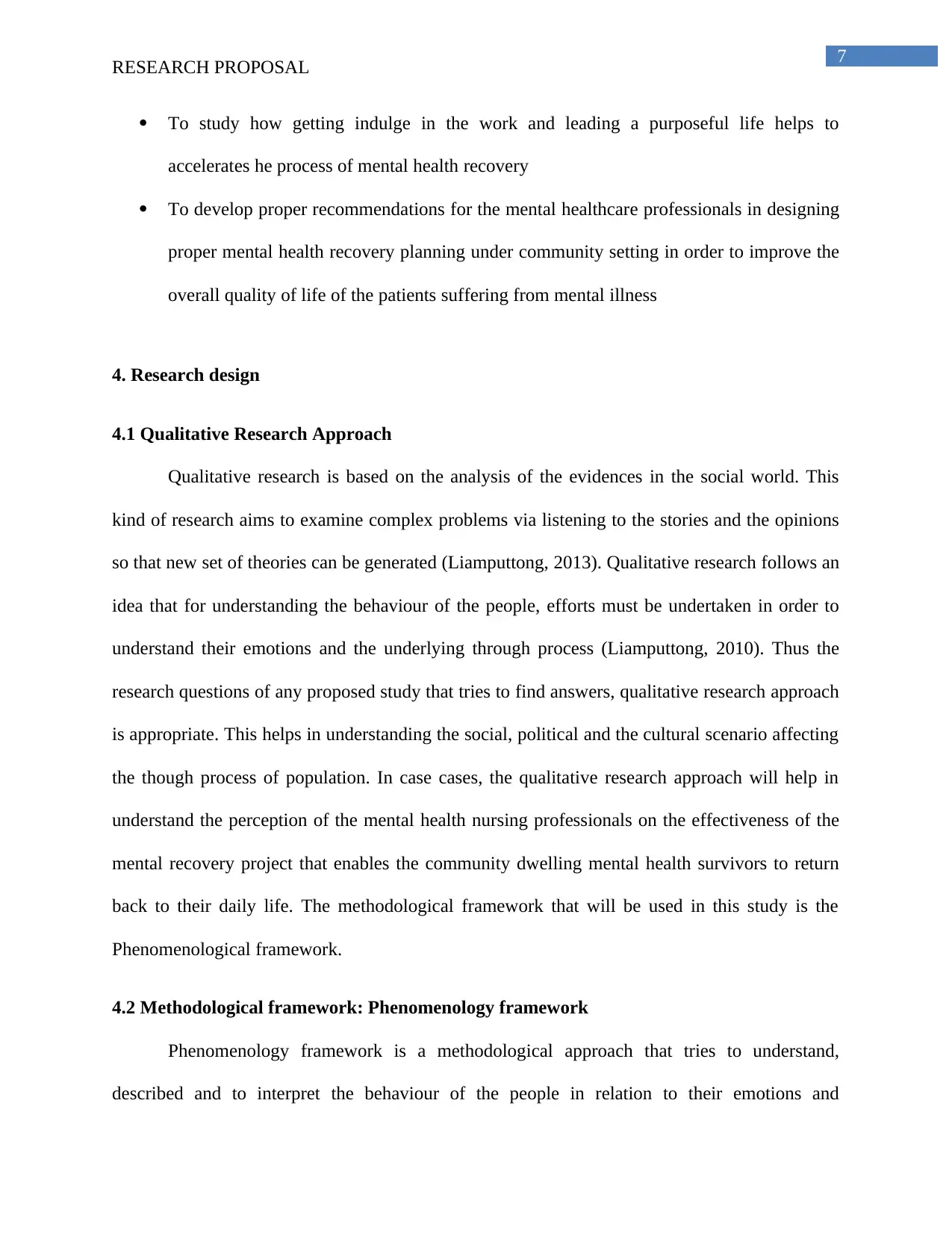
7
RESEARCH PROPOSAL
To study how getting indulge in the work and leading a purposeful life helps to
accelerates he process of mental health recovery
To develop proper recommendations for the mental healthcare professionals in designing
proper mental health recovery planning under community setting in order to improve the
overall quality of life of the patients suffering from mental illness
4. Research design
4.1 Qualitative Research Approach
Qualitative research is based on the analysis of the evidences in the social world. This
kind of research aims to examine complex problems via listening to the stories and the opinions
so that new set of theories can be generated (Liamputtong, 2013). Qualitative research follows an
idea that for understanding the behaviour of the people, efforts must be undertaken in order to
understand their emotions and the underlying through process (Liamputtong, 2010). Thus the
research questions of any proposed study that tries to find answers, qualitative research approach
is appropriate. This helps in understanding the social, political and the cultural scenario affecting
the though process of population. In case cases, the qualitative research approach will help in
understand the perception of the mental health nursing professionals on the effectiveness of the
mental recovery project that enables the community dwelling mental health survivors to return
back to their daily life. The methodological framework that will be used in this study is the
Phenomenological framework.
4.2 Methodological framework: Phenomenology framework
Phenomenology framework is a methodological approach that tries to understand,
described and to interpret the behaviour of the people in relation to their emotions and
RESEARCH PROPOSAL
To study how getting indulge in the work and leading a purposeful life helps to
accelerates he process of mental health recovery
To develop proper recommendations for the mental healthcare professionals in designing
proper mental health recovery planning under community setting in order to improve the
overall quality of life of the patients suffering from mental illness
4. Research design
4.1 Qualitative Research Approach
Qualitative research is based on the analysis of the evidences in the social world. This
kind of research aims to examine complex problems via listening to the stories and the opinions
so that new set of theories can be generated (Liamputtong, 2013). Qualitative research follows an
idea that for understanding the behaviour of the people, efforts must be undertaken in order to
understand their emotions and the underlying through process (Liamputtong, 2010). Thus the
research questions of any proposed study that tries to find answers, qualitative research approach
is appropriate. This helps in understanding the social, political and the cultural scenario affecting
the though process of population. In case cases, the qualitative research approach will help in
understand the perception of the mental health nursing professionals on the effectiveness of the
mental recovery project that enables the community dwelling mental health survivors to return
back to their daily life. The methodological framework that will be used in this study is the
Phenomenological framework.
4.2 Methodological framework: Phenomenology framework
Phenomenology framework is a methodological approach that tries to understand,
described and to interpret the behaviour of the people in relation to their emotions and
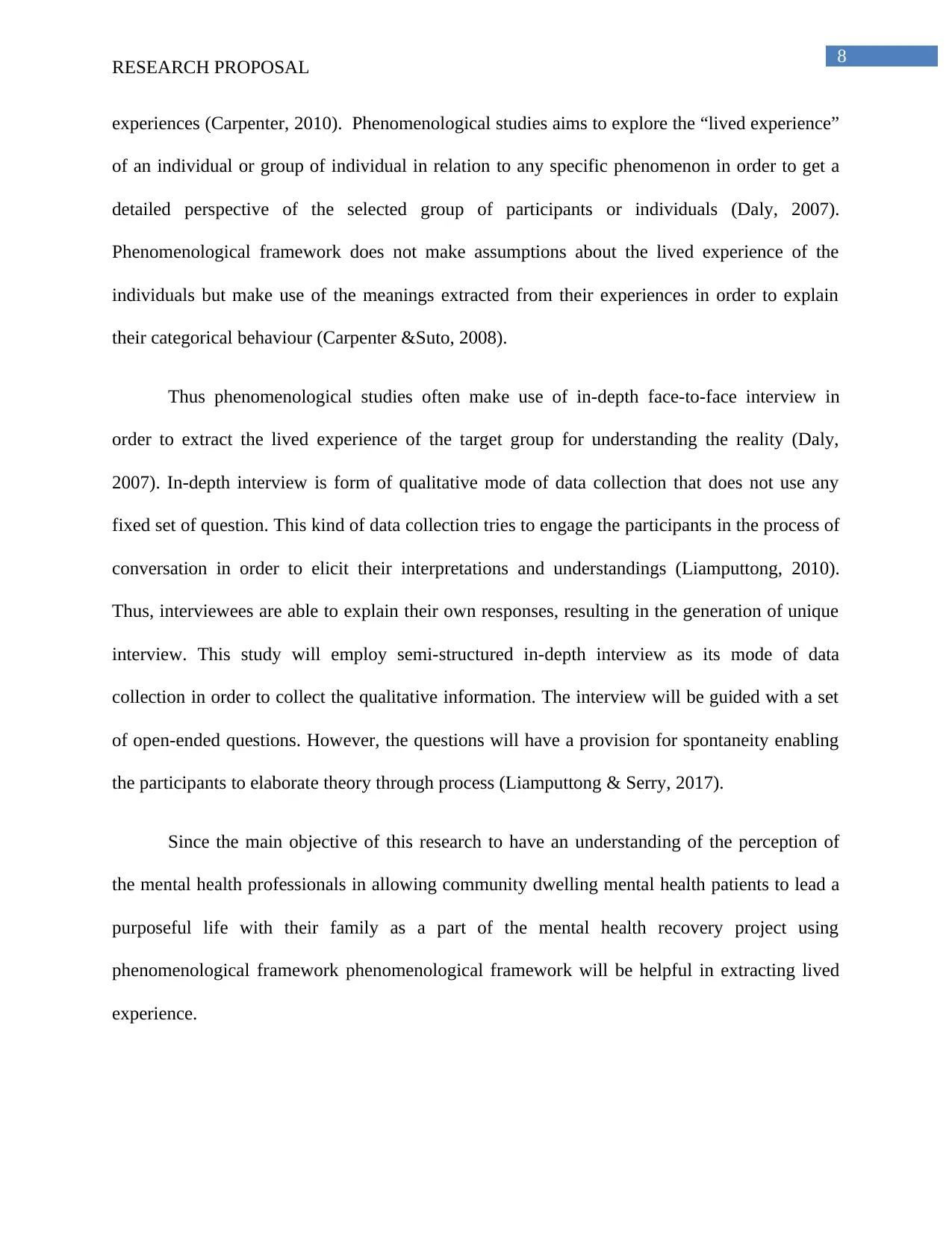
8
RESEARCH PROPOSAL
experiences (Carpenter, 2010). Phenomenological studies aims to explore the “lived experience”
of an individual or group of individual in relation to any specific phenomenon in order to get a
detailed perspective of the selected group of participants or individuals (Daly, 2007).
Phenomenological framework does not make assumptions about the lived experience of the
individuals but make use of the meanings extracted from their experiences in order to explain
their categorical behaviour (Carpenter &Suto, 2008).
Thus phenomenological studies often make use of in-depth face-to-face interview in
order to extract the lived experience of the target group for understanding the reality (Daly,
2007). In-depth interview is form of qualitative mode of data collection that does not use any
fixed set of question. This kind of data collection tries to engage the participants in the process of
conversation in order to elicit their interpretations and understandings (Liamputtong, 2010).
Thus, interviewees are able to explain their own responses, resulting in the generation of unique
interview. This study will employ semi-structured in-depth interview as its mode of data
collection in order to collect the qualitative information. The interview will be guided with a set
of open-ended questions. However, the questions will have a provision for spontaneity enabling
the participants to elaborate theory through process (Liamputtong & Serry, 2017).
Since the main objective of this research to have an understanding of the perception of
the mental health professionals in allowing community dwelling mental health patients to lead a
purposeful life with their family as a part of the mental health recovery project using
phenomenological framework phenomenological framework will be helpful in extracting lived
experience.
RESEARCH PROPOSAL
experiences (Carpenter, 2010). Phenomenological studies aims to explore the “lived experience”
of an individual or group of individual in relation to any specific phenomenon in order to get a
detailed perspective of the selected group of participants or individuals (Daly, 2007).
Phenomenological framework does not make assumptions about the lived experience of the
individuals but make use of the meanings extracted from their experiences in order to explain
their categorical behaviour (Carpenter &Suto, 2008).
Thus phenomenological studies often make use of in-depth face-to-face interview in
order to extract the lived experience of the target group for understanding the reality (Daly,
2007). In-depth interview is form of qualitative mode of data collection that does not use any
fixed set of question. This kind of data collection tries to engage the participants in the process of
conversation in order to elicit their interpretations and understandings (Liamputtong, 2010).
Thus, interviewees are able to explain their own responses, resulting in the generation of unique
interview. This study will employ semi-structured in-depth interview as its mode of data
collection in order to collect the qualitative information. The interview will be guided with a set
of open-ended questions. However, the questions will have a provision for spontaneity enabling
the participants to elaborate theory through process (Liamputtong & Serry, 2017).
Since the main objective of this research to have an understanding of the perception of
the mental health professionals in allowing community dwelling mental health patients to lead a
purposeful life with their family as a part of the mental health recovery project using
phenomenological framework phenomenological framework will be helpful in extracting lived
experience.
⊘ This is a preview!⊘
Do you want full access?
Subscribe today to unlock all pages.

Trusted by 1+ million students worldwide
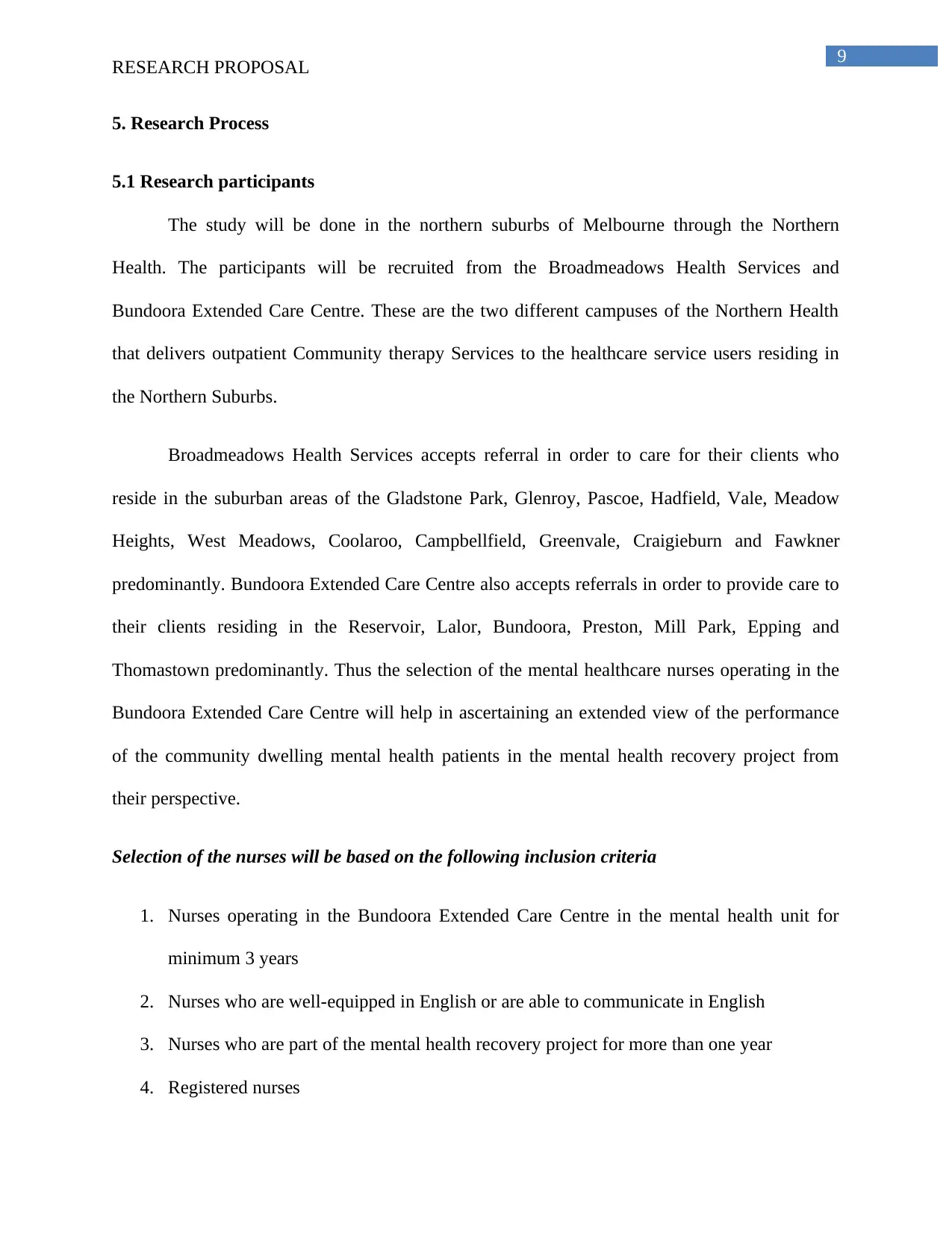
9
RESEARCH PROPOSAL
5. Research Process
5.1 Research participants
The study will be done in the northern suburbs of Melbourne through the Northern
Health. The participants will be recruited from the Broadmeadows Health Services and
Bundoora Extended Care Centre. These are the two different campuses of the Northern Health
that delivers outpatient Community therapy Services to the healthcare service users residing in
the Northern Suburbs.
Broadmeadows Health Services accepts referral in order to care for their clients who
reside in the suburban areas of the Gladstone Park, Glenroy, Pascoe, Hadfield, Vale, Meadow
Heights, West Meadows, Coolaroo, Campbellfield, Greenvale, Craigieburn and Fawkner
predominantly. Bundoora Extended Care Centre also accepts referrals in order to provide care to
their clients residing in the Reservoir, Lalor, Bundoora, Preston, Mill Park, Epping and
Thomastown predominantly. Thus the selection of the mental healthcare nurses operating in the
Bundoora Extended Care Centre will help in ascertaining an extended view of the performance
of the community dwelling mental health patients in the mental health recovery project from
their perspective.
Selection of the nurses will be based on the following inclusion criteria
1. Nurses operating in the Bundoora Extended Care Centre in the mental health unit for
minimum 3 years
2. Nurses who are well-equipped in English or are able to communicate in English
3. Nurses who are part of the mental health recovery project for more than one year
4. Registered nurses
RESEARCH PROPOSAL
5. Research Process
5.1 Research participants
The study will be done in the northern suburbs of Melbourne through the Northern
Health. The participants will be recruited from the Broadmeadows Health Services and
Bundoora Extended Care Centre. These are the two different campuses of the Northern Health
that delivers outpatient Community therapy Services to the healthcare service users residing in
the Northern Suburbs.
Broadmeadows Health Services accepts referral in order to care for their clients who
reside in the suburban areas of the Gladstone Park, Glenroy, Pascoe, Hadfield, Vale, Meadow
Heights, West Meadows, Coolaroo, Campbellfield, Greenvale, Craigieburn and Fawkner
predominantly. Bundoora Extended Care Centre also accepts referrals in order to provide care to
their clients residing in the Reservoir, Lalor, Bundoora, Preston, Mill Park, Epping and
Thomastown predominantly. Thus the selection of the mental healthcare nurses operating in the
Bundoora Extended Care Centre will help in ascertaining an extended view of the performance
of the community dwelling mental health patients in the mental health recovery project from
their perspective.
Selection of the nurses will be based on the following inclusion criteria
1. Nurses operating in the Bundoora Extended Care Centre in the mental health unit for
minimum 3 years
2. Nurses who are well-equipped in English or are able to communicate in English
3. Nurses who are part of the mental health recovery project for more than one year
4. Registered nurses
Paraphrase This Document
Need a fresh take? Get an instant paraphrase of this document with our AI Paraphraser
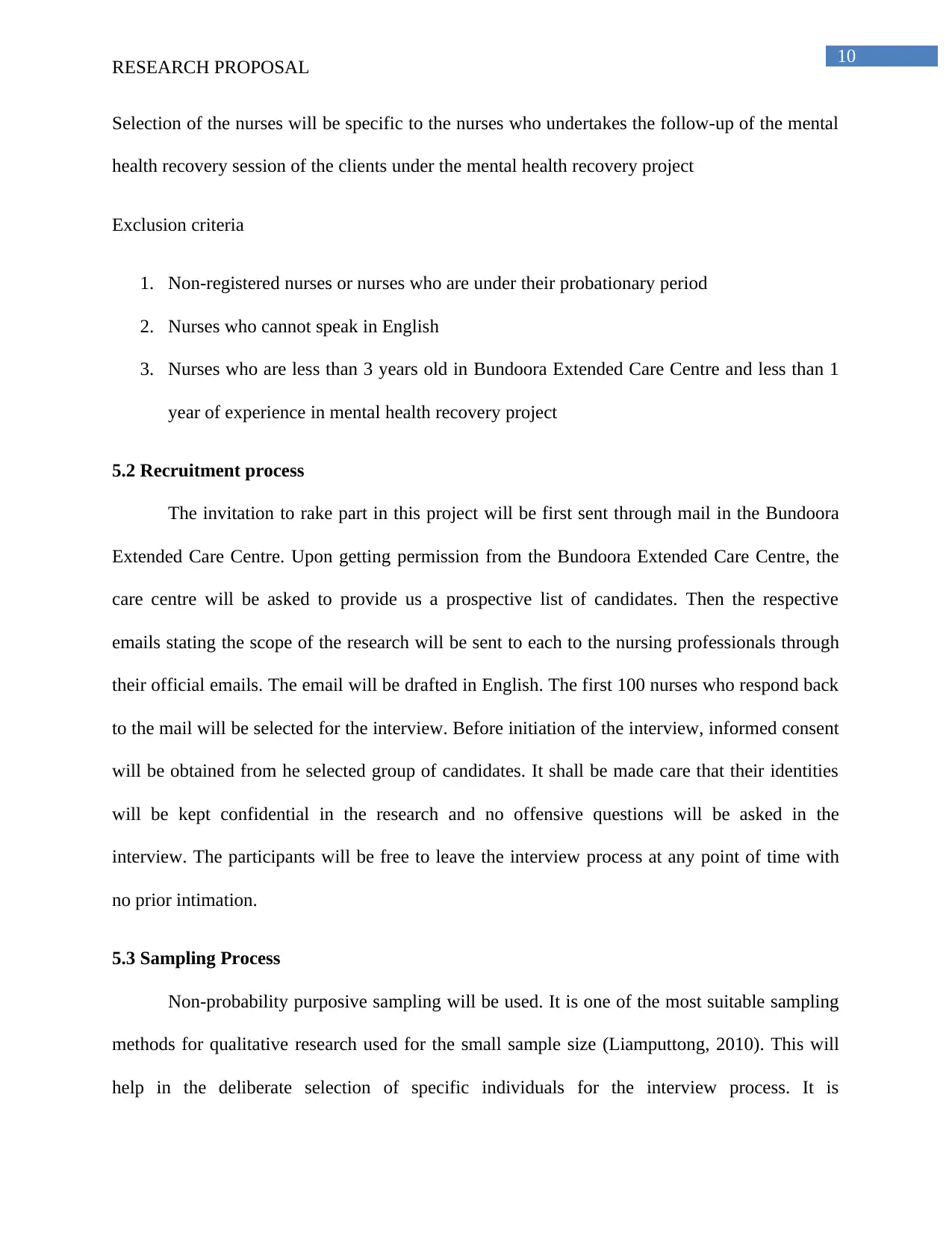
10
RESEARCH PROPOSAL
Selection of the nurses will be specific to the nurses who undertakes the follow-up of the mental
health recovery session of the clients under the mental health recovery project
Exclusion criteria
1. Non-registered nurses or nurses who are under their probationary period
2. Nurses who cannot speak in English
3. Nurses who are less than 3 years old in Bundoora Extended Care Centre and less than 1
year of experience in mental health recovery project
5.2 Recruitment process
The invitation to rake part in this project will be first sent through mail in the Bundoora
Extended Care Centre. Upon getting permission from the Bundoora Extended Care Centre, the
care centre will be asked to provide us a prospective list of candidates. Then the respective
emails stating the scope of the research will be sent to each to the nursing professionals through
their official emails. The email will be drafted in English. The first 100 nurses who respond back
to the mail will be selected for the interview. Before initiation of the interview, informed consent
will be obtained from he selected group of candidates. It shall be made care that their identities
will be kept confidential in the research and no offensive questions will be asked in the
interview. The participants will be free to leave the interview process at any point of time with
no prior intimation.
5.3 Sampling Process
Non-probability purposive sampling will be used. It is one of the most suitable sampling
methods for qualitative research used for the small sample size (Liamputtong, 2010). This will
help in the deliberate selection of specific individuals for the interview process. It is
RESEARCH PROPOSAL
Selection of the nurses will be specific to the nurses who undertakes the follow-up of the mental
health recovery session of the clients under the mental health recovery project
Exclusion criteria
1. Non-registered nurses or nurses who are under their probationary period
2. Nurses who cannot speak in English
3. Nurses who are less than 3 years old in Bundoora Extended Care Centre and less than 1
year of experience in mental health recovery project
5.2 Recruitment process
The invitation to rake part in this project will be first sent through mail in the Bundoora
Extended Care Centre. Upon getting permission from the Bundoora Extended Care Centre, the
care centre will be asked to provide us a prospective list of candidates. Then the respective
emails stating the scope of the research will be sent to each to the nursing professionals through
their official emails. The email will be drafted in English. The first 100 nurses who respond back
to the mail will be selected for the interview. Before initiation of the interview, informed consent
will be obtained from he selected group of candidates. It shall be made care that their identities
will be kept confidential in the research and no offensive questions will be asked in the
interview. The participants will be free to leave the interview process at any point of time with
no prior intimation.
5.3 Sampling Process
Non-probability purposive sampling will be used. It is one of the most suitable sampling
methods for qualitative research used for the small sample size (Liamputtong, 2010). This will
help in the deliberate selection of specific individuals for the interview process. It is
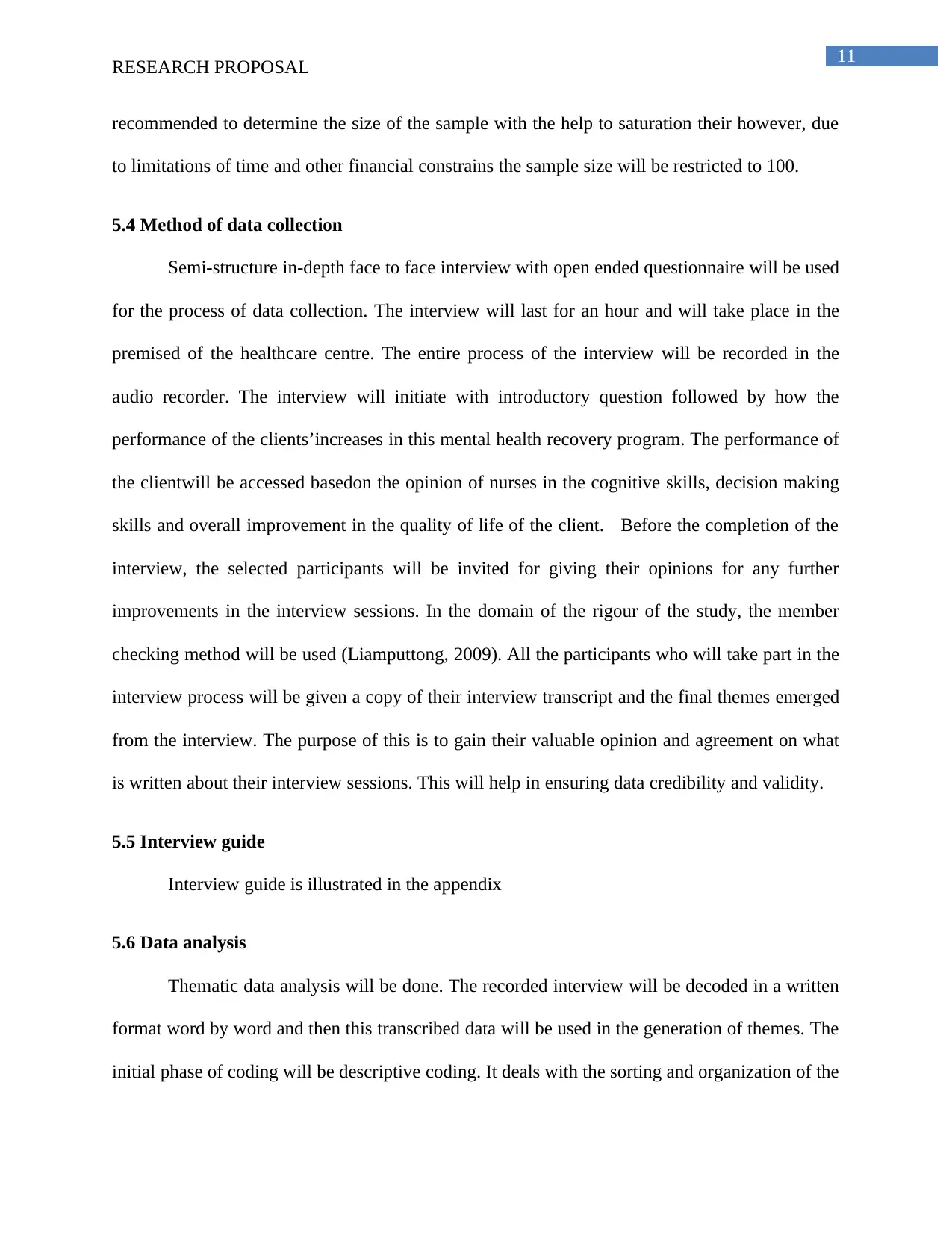
11
RESEARCH PROPOSAL
recommended to determine the size of the sample with the help to saturation their however, due
to limitations of time and other financial constrains the sample size will be restricted to 100.
5.4 Method of data collection
Semi-structure in-depth face to face interview with open ended questionnaire will be used
for the process of data collection. The interview will last for an hour and will take place in the
premised of the healthcare centre. The entire process of the interview will be recorded in the
audio recorder. The interview will initiate with introductory question followed by how the
performance of the clients’increases in this mental health recovery program. The performance of
the clientwill be accessed basedon the opinion of nurses in the cognitive skills, decision making
skills and overall improvement in the quality of life of the client. Before the completion of the
interview, the selected participants will be invited for giving their opinions for any further
improvements in the interview sessions. In the domain of the rigour of the study, the member
checking method will be used (Liamputtong, 2009). All the participants who will take part in the
interview process will be given a copy of their interview transcript and the final themes emerged
from the interview. The purpose of this is to gain their valuable opinion and agreement on what
is written about their interview sessions. This will help in ensuring data credibility and validity.
5.5 Interview guide
Interview guide is illustrated in the appendix
5.6 Data analysis
Thematic data analysis will be done. The recorded interview will be decoded in a written
format word by word and then this transcribed data will be used in the generation of themes. The
initial phase of coding will be descriptive coding. It deals with the sorting and organization of the
RESEARCH PROPOSAL
recommended to determine the size of the sample with the help to saturation their however, due
to limitations of time and other financial constrains the sample size will be restricted to 100.
5.4 Method of data collection
Semi-structure in-depth face to face interview with open ended questionnaire will be used
for the process of data collection. The interview will last for an hour and will take place in the
premised of the healthcare centre. The entire process of the interview will be recorded in the
audio recorder. The interview will initiate with introductory question followed by how the
performance of the clients’increases in this mental health recovery program. The performance of
the clientwill be accessed basedon the opinion of nurses in the cognitive skills, decision making
skills and overall improvement in the quality of life of the client. Before the completion of the
interview, the selected participants will be invited for giving their opinions for any further
improvements in the interview sessions. In the domain of the rigour of the study, the member
checking method will be used (Liamputtong, 2009). All the participants who will take part in the
interview process will be given a copy of their interview transcript and the final themes emerged
from the interview. The purpose of this is to gain their valuable opinion and agreement on what
is written about their interview sessions. This will help in ensuring data credibility and validity.
5.5 Interview guide
Interview guide is illustrated in the appendix
5.6 Data analysis
Thematic data analysis will be done. The recorded interview will be decoded in a written
format word by word and then this transcribed data will be used in the generation of themes. The
initial phase of coding will be descriptive coding. It deals with the sorting and organization of the
⊘ This is a preview!⊘
Do you want full access?
Subscribe today to unlock all pages.

Trusted by 1+ million students worldwide
1 out of 20
Related Documents
Your All-in-One AI-Powered Toolkit for Academic Success.
+13062052269
info@desklib.com
Available 24*7 on WhatsApp / Email
![[object Object]](/_next/static/media/star-bottom.7253800d.svg)
Unlock your academic potential
Copyright © 2020–2026 A2Z Services. All Rights Reserved. Developed and managed by ZUCOL.





